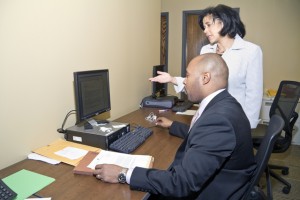
Professor Allison Bethel, director of The John Marshall Law School Fair Housing Legal Clinic, helps student Louis Raymond with a letter for a client.
When a Chicago mother took her housing voucher and her daughter to what she hoped was their future home, she met with a landlord who refused to let her apply because she had a young child in tow.
“Section 8 people with vouchers are considered undesirable to landlords,” said Allison Bethel, clinical professor and director of the Fair Housing Legal Clinic at The John Marshall Law School.
The vouchers are issued by the U.S. Department of Housing and Urban Development (HUD) to assist low-income families, the elderly and the disabled in finding decent and safe housing. Most of those receiving vouchers are considered the working poor, according to Bethel, and because of their limited income landlords are less inclined to rent to them.
The clinic challenged the landlord’s refusal to let the woman apply as familial status discrimination. With the help of HUD and the clinic, she sued the landlord for $4,500 in damages and a three-year review of his rental practices.
The woman won her case. It was just one of many cases the clinic has handled in its almost 20 years of operation. Michael Seng, professor and co-executive director of the Fair Housing Legal Support Center, had a dream for this clinic in 1985, and with funding through the U.S. Department of Education, a free-standing clinic was up and running by 1993.
The clinic allows students to gain real-world experience by representing clients who have been denied housing because of their age, race, nationality, sex, familial status, disability, sexual orientation or income. The clinic provides free representation to those who may not have access to an attorney, or refers individuals to outside attorneys.
The clinic is staffed by Bethel and Clinical Professor Damian Ortiz Adjunct Clinical Professor Lewis Powell III; Testing Coordinator and Director of Investigations Mary Jo Noriega, and Clinical Attorney Fellows Yevgenia Baranov and Grace Okorie.
Students, who are supervised by the clinic staff, get the experience but also are given the opportunity to participate in federal court litigation and sometimes state and administrative proceedings. Students help draft pleadings, prepare motions and hearings for a temporary restraining order and preliminary injunction, conduct discovery, and assist in trials, hearings and possible appeals.
“There is nothing better than learning through actual practice,” said Kevin Cruz, a student active at the Clinic. “I learned more about the legal field at the Fair Housing Legal Clinic than I have in any other class.”
